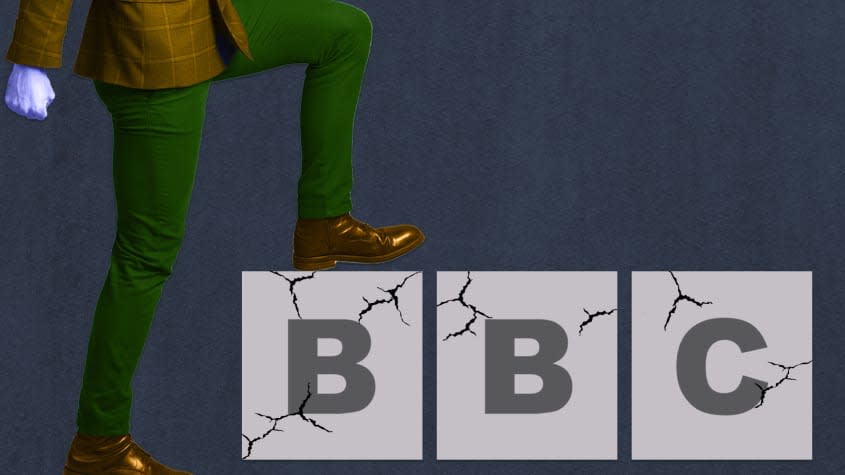Why the Indian government is cracking down on the BBC

The BBC and the Indian government are in a battle over free expression in the south Asian country. Officials with the government raided BBC newsroom offices in Delhi and Mumbai on Tuesday, Wednesday, and Thursday this week, CNN reports, after the broadcaster aired a documentary that criticizes Prime Minister Narendra Modi. That follows the government's attempts both to ban the documentary and — using emergency laws — force social media sites to take down clips. "Critics decried it as an assault on press freedom," CNN says, but Modi's allies have accused the broadcaster of having a "colonial mindset." What does the BBC documentary say? And does Modi's crackdown signal that India is sliding into authoritarianism? Here's everything you need to know:
What is in the BBC documentary?
The first episode of India: The Modi Question goes back several decades to examine Modi's actions in 2002, when he was the chief minister of the state of Gujarat. "It was during this time that 60 Hindu pilgrims were killed when their train carriage was set alight," The Guardian reports. Muslims were blamed for the deaths, and retaliatory riots ended up killing more than 1,000 people, most of them Muslims. Investigators appointed by India's Supreme Court cleared Modi of allegations he was complicit in the violence, but the new documentary unveiled a previously secret report within the British government that faulted Modi and said the violence had "hallmarks of ethnic cleansing." The second episode focuses on the "troubled relationship" between Modi's government and the country's Muslim minority. Modi's party — the Bharatiya Janata Party (BJP) — is often described as a Hindu nationalist party that has undone legal protections for the country's Christians and Muslims.
What is Modi's response?
In January, an Indian foreign ministry slammed the documentary. "Let me just make it very clear that we think this is a propaganda piece designed to push a particular discredited narrative," said Arindam Bagchi. "The bias, the lack of objectivity, and frankly a continuing colonial mindset, is blatantly visible." On PBS NewsHour, Bloomberg Opinion's Bobby Ghosh noted the government's anger was to be expected for two reasons: First, Modi's administration "has been very, very thin-skinned about any kind of criticism, even the mildest kind of criticism." But it has also spent years trying to tamp down the charges of Modi's involvement in the 2002 riots. "The government thought that it had put the matter to bed, it had intimidated and silenced all its critics, anybody who could bring it up." The documentary shows old questions aren't going away.
What actions has the government taken?
The government is trying to make the old questions go away. In late January, it blocked the airing of the BBC documentary within India, Reuters reports, "saying that even sharing of any clips via social media is barred." YouTube and Twitter were ordered to take down clips and tweets about the program, and they complied. And it asked the nation's Supreme Court to ban the BBC entirely, The Hindu reports, claiming that "the BBC film was intended to surreptitiously disturb the peace and national integrity of the country." The court declined. Three days of raids on BBC offices, ostensibly part of a tax investigation, have followed. All of this has raised cries of alarm from press freedom advocates. "The Modi government is clearly abusing emergency powers … to punish or restrict any and all criticism of its policies," says Amy Brouillette of the International Press Institute.
Is the ban working?
That's questionable. "Indians are easily circumventing" the ban, Rest of World reports, creating a Streisand effect that has "driven new interest and drawn attention to an ugly chapter in the prime minister's history." University students across the country have scheduled gatherings to watch the documentary — though those viewings have also been subject to crackdowns. During one January incident at Delhi's Jamia Millia Islamia university, 13 students were detained "amid a heavy police deployment," Reuters reports. At another university, officials apparently cut off power on campus as students prepared to screen the program on their phones and laptops. But at least one opposition party has vowed to show the documentary in every state. "They won't stop the voice of dissent," said Mayukh Biswas, a leader of the student wing of the Communist Party of India.
What does this mean for India?
Foreign Policy reports that while Western governments have tried to partner with Modi's government, India under Modi's leadership has become "an increasingly illiberal place, where activists are jailed and minority rights are undermined." The government's reaction to the BBC documentary has had the unintended effect of highlighting those problems on the international stage — and placed pressure on India's relationship with the British government, which subsidizes and oversees the broadcaster. But there is also increasing dissatisfaction at home, The Atlantic reports, especially among Muslims who "saw their houses and shops bulldozed, their businesses boycotted, and their religious gatherings heckled by Hindu-nationalist mobs" during last year's Ramadan observance. A national election will be held next year, The Guardian notes. Modi is still expected to win, "but it is still a critical moment for the government."
You may also like
Nearly Russia's entire army is in Ukraine, suffering '1st World War levels of attrition,' U.K. says
Why U.S. teens aren't getting their driver's licenses
Sen. John Fetterman receiving treatment for clinical depression


